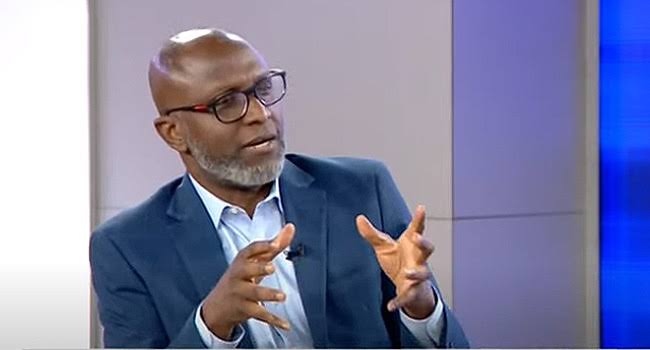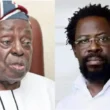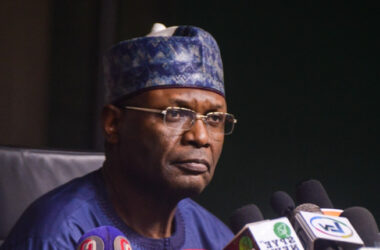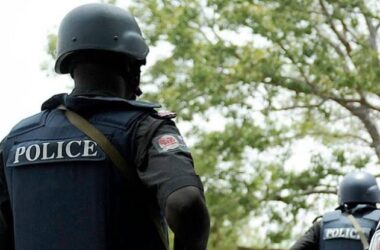Veteran journalist and former presidential aide, Laolu Akande, has raised concerns about the ongoing legal travails of Dele Farotimi, a prominent lawyer and activist. Speaking on the My Take segment of Inside Sources with Laolu Akande on Channels TV on Sunday, Akande criticized the manner in which Farotimi has been treated, describing it as a disservice to the rule of law and a deviation from the principles of justice.
“There have been some claims that perhaps Tinubu’s administration is behind the travails of Mr. Dele Farotimi. Now, I haven’t seen any conclusive proof of that. And, based on what I know, I think that is unlikely. When we look at the travails that Mr. Dele Farotimi is going through, this is nothing short of injustice,” Akande said.
He detailed the irregularities surrounding Farotimi’s arrest and subsequent legal proceedings, including his transfer from Lagos, where criminal defamation has been decriminalized, to Ekiti State.
“The man was arrested and corralled from Lagos to Ekiti State. He was taken away from Lagos because Lagos has decriminalized criminal defamation. We now know, on solid authority, that the police authorities in Lagos were not aware. Because, under the procedure, even if you brought a warrant of arrest from another state to a different state, you have to put an incident report in that state where you want to do the arrest. And the Magistrate Court in that state, in this instance Lagos, will have the opportunity to even examine the warrant and possibly grant bail to the person that you wanted to arrest. All of that did not happen.”
He further criticized the contradictory rulings between the Federal High Court in Ekiti, which granted Farotimi bail, and the Magistrate Court, which refused to do so.
“What is clear is, the time has come for saner minds to prevail in this contestation between Chief Afe Babalola, SAN, and Mr. Dele Farotimi. What Nigerians deserve – and all people of goodwill – is a fair process that enables the person that is being alleged an opportunity to prove the case and then to have the court make a ruling whether indeed Mr. Dele Farotimi has defamed Chief Afe Babalola. Without that determination, to have to take Dele Farotimi through the travails, with him being handcuffed in his first public appearance after he was arrested, is a shame to all of us.”
“This is not in the best interest of the rule of law, in the best interest of a sane and free society that we all aspire to live in.”
Akande, known for his candid analysis, addressed the broader context of Nigeria’s governance challenges before delving into the specifics of Farotimi’s case. He countered the notion that Nigeria is a “glaringly failed state,” as previously asserted by former President Olusegun Obasanjo in a recent U.S. address. Akande highlighted recent diplomatic engagements involving Nigeria as evidence to the contrary:
“Nigeria has very critical challenges. Some of them are actually worrying, but Nigeria is not a glaringly failed state. The President of Germany visited Nigeria. This was after the President of Brazil, the President of South Africa, and the President of France held several meetings in their capitals with the President of Nigeria. If Nigeria were to be a glaringly failed state, do you think that all these presidents in a row would be lining up to meet with the Nigerian president? All these four meetings with the president happened right after former President [Olusegun] Obasanjo in his U.S. speech described Nigeria as a glaringly failed state. The question is there for us to ponder.”
He acknowledged Nigeria’s imperfections but argued that such international engagements underscore the country’s resilience and global relevance. Akande added:
“What is clear is that the former president had engaged in inadvisable hyperbole. But the point is this: President Bola Ahmed Tinubu has the opportunity to do better than President Obasanjo while he is still in office. And there is no reason why President Tinubu cannot do better than the record of President Obasanjo. That is the only way that President Tinubu can actually silence the hyper-looting and sometimes unflattering commentary of former President Obasanjo. Without that, we will all have to contend with President Obasanjo’s tendency to think every other president is not close to his records.”
The case of Dele Farotimi has reignited debates about the administration of justice in Nigeria and the need for judicial processes that are transparent, fair, and respectful of individual rights. Akande’s observations serve as a clarion call for reforms that safeguard these principles and promote a more just society.










